Every time you type a query in a search engine, it collects information about you. This has made many users concerned about the personal data captured by search engines such as Google, Yahoo, Bing, Baidu, etc.
Therefore, to protect privacy, increase security, and, in some cases, maintain anonymity, internet users are switching to private search engines when browsing the internet. If you have any of the above-mentioned concerns and want to learn about private search engines, this blog is for you.
This blog will be your comprehensive guide to the top 11 private search engines in 2024. You will learn about what a private search engine is, its benefits, and the various features offered by different search engines available.
A private search engine is a program that allows you to browse the internet without storing your personal information of any kind. Private search engines are also known as secure search engines or anonymous search engines.
A private search engine maintains your privacy as a user. However, each search engine offers a different privacy level based on how it generates revenue.
The majority of search engines, such as Google, Yahoo, and Bing, amass extensive information about users. This includes
- IP addresses
- user agents
- a distinct identifier stored in browser cookies
- Search terms.
This data enables search engine companies to analyze your user behavior, deliver personalized advertisements, and track individuals. Remarkably, under EU GDPR laws, metadata and IP addresses are recognized as personally identifiable information.
To comply with GDPR, all search engine companies must provide users with the option to either withhold the disclosure of this digital data or be transparent regarding its collection.
Uncovering the specifics of the data collected about an individual and potentially removing it requires a thorough investigation. In many instances, there is no absolute assurance that the data will be completely erased. Nevertheless, you can take proactive steps within their control, such as deleting your search history.
There are two types of private search engines; let us have a look at them.

A free or anonymous private search engine does not collect any of your data. However, it does need money to stay operational, and because of this, such private search engines are ad-supported. It means that a free private search engine may track your data.
Furthermore, when you click any of the ads shown, it allows the private search engines to generate revenue to survive.

A paid private search engine generates revenue through the sale of its subscription plans.
Consequently, a paid private search engine gathers data solely for enhancing your search experience without engaging in data selling practices. Compared to free alternatives, private search engines prioritize user privacy to a significantly greater extent.
Despite this, you have the flexibility to experiment with various free search engines for trial purposes. If a particular free search engine aligns with your preferences, making the switch to a paid alternative is strongly advised.


If you are in search of the best private search engines, take a look at our carefully selected top 11 private search engines in 2024.

DuckDuckGo is one of the most popular and widely used private search engines. It prioritizes user privacy through its commitment to not track searches or store personal information. Catering to millions of users, it offers a variety of features that enable web browsing by aggregating results from both other search engines and its own web crawler, effectively functioning as a metasearch engine.
One distinctive aspect of DuckDuckGo is its renowned “!bang” commands. This command allows you to search other sites directly through the DuckDuckGo search box.

For instance, if you wish to explore national parks in Texas using Google, you can input “!bang Google national parks Texas,” obtaining Google’s results without enduring data collection.
For revenue generation, DuckDuckGo specifies on its website that it generates income through private ads. This means users may encounter sponsored links at the top of search results, akin to mainstream search engines, while still maintaining a commitment to user privacy.
Best for:
Anonymous and private search experience without search engines or advertisers tracking you.
Benefits
- Prevent tracking from social media ads, including Facebook, Amazon, and Google.
- Categorize search results for enhanced organization
- Eliminate email trackers for increased privacy
- Implement contextual advertising based on search queries rather than user profiling
Features
- Employ SSL encryption to ensure secure connections.
- Utilize tracker blocking to thwart third-party tracking.
- “!bang” shortcuts for direct searches on various websites.
- Offer desktop and mobile apps, as well as browser extensions for versatile accessibility.
- Provide email protection, a service that eliminates email trackers through forwarding.
Price: Free
Qwant is a privacy-focused search engine created and hosted in France, delivering an impartial and secure search experience. With its independent web indexing, Qwant ensures unbiased information retrieval without data collection.
The platform refrains from tracking your searches and abstains from utilizing cookies. Beyond its search engine, Qwant has introduced an alternative to Google Maps, enabling navigation without tracking users. Qwant sustains its revenue through advertising, primarily employing short contextual ads.
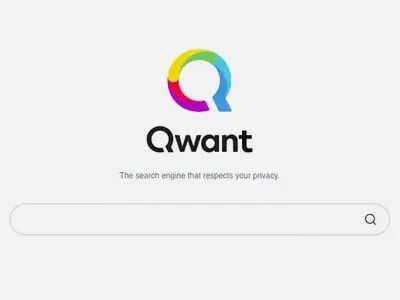

Best for:
Search experience that respects your privacy while delivering comprehensive results on the internet.
Benefits
- Build-in private web indexing
- Blocks cookies and trackers
- Alternate to Google Maps
Features
- An integrated 3-in-1 application and browser extension
- A personalized maps application
- Qwant Junior, a child-friendly search engine that blocks inappropriate content and refrains from displaying advertisements
Price: Free
SearchEncrypt is an additional private search engine prioritizing data protection through local encryption. By obtaining results from its network of search partners, it ensures user privacy. Notably, SearchEncrypt automatically erases your search terms post-browsing, enhancing overall privacy.
Its default privacy features surpass those of DuckDuckGo. Additionally, you can benefit from the SearchEncrypt Google Chrome extension, offering a user-friendly experience for searching news, maps, and privacy-conscious videos.
Best for:
User-friendly search experience with ultimate data encryption.
Benefits:
- Privacy-focused search engine
- Highly encrypted searches and browsing
Features
- Advanced Security & Encryption options
- Easy redirection and interception
Price: Free
Yippy is a meticulously organized private search engine that efficiently categorizes search results for your convenience. The platform provides the flexibility to flag or filter categories according to your preferences.
With a user-friendly interface and a no-ad policy, Yippy ensures a seamless experience. Furthermore, users can explore a diverse range of content, including jobs, news, images, blogs, and more, making it a versatile search tool.
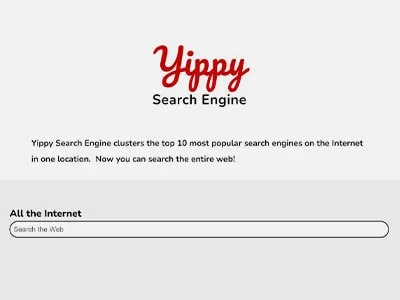

Best for
Job searches, news, latest information, blogs, and more.
Benefits
- Eliminating the need for you to go through a list of search results without any assistance.
- Manages a wide range of access issues and information aggregation, such as unified information access and big data
Features
- Utilize content connectors for pinpointing pertinent searches.
- Implement field-level security measures to maintain search confidentiality.
- Access extensive customization options.
Price: Free
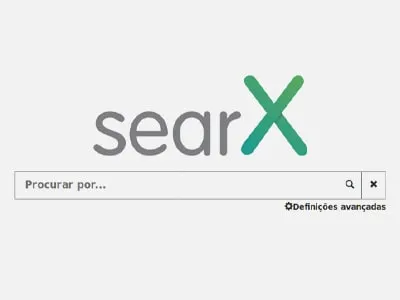
Searx is an open-source private search engine that compiles search outcomes from diverse sources. It allows you to either operate it on your own server or actively participate in code contributions via GitHub.
Searches conducted on Searx do not get logged in its records or appear in your URL history, ensuring a heightened level of privacy. Notably, Searx operates as a non-profit initiative, guaranteeing an ad-free experience without sponsored links.

Best for
Privacy-conscious users who want a customized search experience.
- Benefits
Allow you to customize your search preferences - Anonymous search capabilities
- Aggregates search results from multiple sources
- Self-hosting option available for enhanced privacy control
Features
- Has its own servers
- Firefox extension (JavaScript required)
- Self-hosting option for advanced users
Price: Free
Swisscows has established itself as an independent private search engine tailored for the German market. It integrates Bing for web searches, functioning as a partial metasearch engine. The platform employs semantic data recognition to produce search outcomes.
It also enhances accuracy by interpreting the intent and context of search terms rather than relying solely on literal matches. Swisscows is not limited to search; it has developed TeleGuard, a WhatsApp alternative, and GetDigest, an AI-based program.


The revenue model involves a partnership with Bing, where search ads aligned with your search terms are displayed. Swisscows earns a portion of advertising revenue for each link click.
Best for
Precise search results while safeguarding your privacy and data security at all times.
Benefits
- Accurate results due to semantic search technology
- family-friendly content filtering
- Fetches search results from Bing search engine while maintaining your privacy
Features:
- GetDigest, an AI-based program to summarize and deliver requested information
- TeleGuard, a data-secure and efficient messenger service
Price: Free
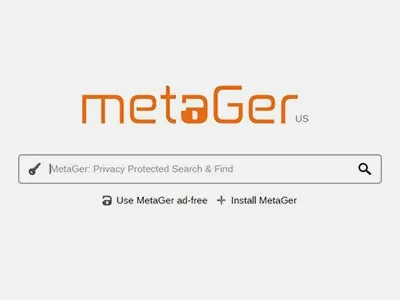
MetaGer is an open-source meta-search engine hailing from Germany. It compiles search results from multiple search engines with servers operating on 100% renewable energy. Committed to user privacy, MetaGer refrains from collecting, storing, or sharing your personal data.
The platform enhances privacy through features like the anonymizing proxy, “Open Anonymously.” It is operated by the non-profit organization SUMA-EV and sustains itself through advertising revenue.

While you can enjoy this private search engine for free, it offers a paid version that eliminates ads.
Best for
Comprehensive search experience from multiple sources and if you are interested in renewable energy.
Benefits
- Compile search outcomes from diverse sources
- Deliver a search experience prioritizing anonymity and privacy
- Choices for anonymous proxy browsing
- Promote transparency
Features
- You can also create a personal blacklist
- Android app available
- Own Maps app
Price: Free, with a paid option for ad-free searching
Mojeek is a standalone UK-based private search engine. It pioneered the adoption of a no-tracking policy, setting a precedent in the search engine domain. Mojeek offers beyond standard web and image search capabilities and provides unfiltered world news, free from user profile curation. The platform sustains itself through contextual advertising for revenue generation.
Best for
Search neutrality without being tracked
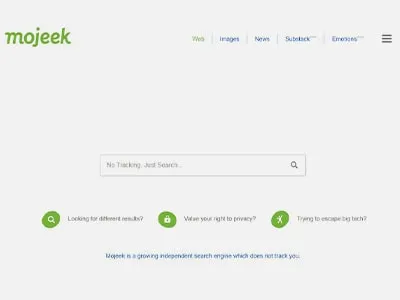


Ecosia is an unconventional private search engine with a strong emphasis on environmental sustainability. It exclusively utilizes Bing for searches, essentially acting as an intermediary between users and Bing.
This search engine generates its revenue through the Microsoft Advertising Network. Therefore, you will see paid ads from Bing in your search results. As a non-profit entity, Ecosia directs its ad revenue toward tree-planting initiatives. Furthermore, the company has established solar plants, contributing to its carbon-negative status.

Best for
Privacy-focused searches on an eco-friendly private search
Benefits
- Privacy-focused and transparent search experience
- Generate revenue to plant trees through search ads
Features
- Search results from Bing
- Easy access with browser extensions
- Quick access via browser extensions
Price: Free
Gibiru is a private search engine dedicated to delivering uncensored and unfiltered search results. It provides you access to information beyond Big Tech’s censorship constraints to ensure privacy. Gibiru offers a search experience devoid of cookies, logging, and targeted advertising.
For added privacy, you can utilize the Gibiru Wormhole app available on Android or iOS. This allows you to search without a trace of search history or visited sites. The platform generates revenue through commissions earned on paid ads and affiliate links.


Best for
Privacy-focused searches on an eco-friendly private search
Benefits
- Privacy-focused and transparent search experience
- Generate revenue to plant trees through search ads
Features
- Search results from Bing
- Easy access with browser extensions
- Quick access via browser extensions
Price: Free

WolframAlpha, more accurately described as an answer engine rather than a search engine, sources information from academic databases to provide fact-based responses to queries. It operates without tracking user searches and prioritizes the delivery of precise information.
The interface of this private search engine is structured with entry points categorized broadly. These include mathematics, science, and technology. Further subdivisions of categories include physics,

chemistry, and engineering. WolframAlpha sustains itself through a subscription-based revenue model.
Best for
Computational and factual search results queries with ultimate privacy.
Benefits
- Offer access to a wide range of data and information
- Assist with knowledge queries, calculations, and data analysis
- Accurate results with ultimate privacy
Features
- Accurate factual answers on various technical topics
- Calculations, data analysis, and knowledge retrieval
Price: Free, Upgrade to Pro or Pro Premium

